After opening its doors ten days ago to interstate visitors, Ballandean Estate Wines is reporting a minimal impact on visitation. Queenslanders continue to embrace a wine country getaway as visitors pour in from the Sunshine Coast and Brisbane primarily.
Leeanne Puglisi-Gangemi, fourth-generation vigneron at Queensland’s oldest family-owned and -operated winery on the Granite Belt, says,
Like all businesses along the NSW-QLD border, we’ve been intrigued as to how the lifting of border restrictions will impact our business. Before Victoria’s COVID situation escalated, we were anticipating an influx of grey nomads.
Since the borders re-opened, we have hardly any visitors identify as from New South Wales. And yes, we’ve been asking! Everyone who comes through our cellar door is required to sign in under our COVID-safe venue plan.
Up until the last few weeks, most of our visitors have been return visitors that know and love the Granite Belt for all of its natural beauty, fine wine, abundant gourmet delights, quirky charms and country hospitality.
What we have been thrilled to discover is that a huge proportion of our Queenslander visitors are here on the Granite Belt for the first time. For so many Queenslanders, the Granite Belt has been sitting on their ‘One Day’ wish list. Now it seems that has rapidly changed to ‘This Year’ and ‘Good to Go!’
Until you experience the glory of the Granite Belt in person, it can be hard to compete with the abundance of destinations within an hour of Brisbane and the Gold Coast.
If the last few weeks are anything to go by, the Granite Belt is set for its best spring season yet! This has traditionally been a quieter time of year. However, we have tastings booked up online through to September, and accommodation house are reporting unheard-of occupancy rates.
I expect that our Tenterfield locals are staying put to avoid the border patrol, and that our southern visitors are either staying put or venturing further north chasing the sun after months of border restrictions.
We hope that Queensland continues to remain COVID-safe and that we can maintain then improve upon the current level of restriction for venues. I think that people are really understanding the importance of hand hygiene, social distancing and contact tracing at venues.
Our cellar door hand Elijah Smith made me a hand sanitiser holster to help me keep safe as I serve tastings to over 500 people each weekend.
Ms Puglisi-Gangemi was instrumental in successfully lobbying the Office of Liquor and Gaming for some easing of restrictions and is an active member of the Queensland Wine Industry Association .
How to make sure you book an unforgettable wine tasting experience at Ballandean Estate
- We’d love it if you could book your tasting in advance online or over the phone. Our peak times are over lunch and on Saturdays, and we highly recommend booking first.
- If you want to come in on the day and have not yet booked, we ask that you pick up the phone and call us on (07) 4684 1226 so that we can fit you in.
- Walk-ins are always welcome, keep your beanie handy as we could be wine-tasting under the pergola in the winter sun if there is an overflow of people.
ENDS
For all media enquiries please contact: Robyn Puglisi-Henderson or Leeanne Puglisi-Gangemi
Ph: (07) 4684 1226 Leeanne@ballandeanestate.com, Robyn@ballandeanestate.com 354 Sundown Rd Ballandean 4382 www.ballandeanestate.com
Welcome to Ballandean Estate, Queensland’s oldest family owned and operated winery. Our family has been making wine on our Granite Belt estate since 1932, and we would love to share our estate grown and made wines with you. This year we are celebrating 50 years of Shiraz plantings in our high altitude vineyard and our 30th vintage of Semillon Sauvignon Blanc. As a multi-awarded 4.5-star winery, Ballandean Estate has an excellent range of mainstream and alternative wines that showcase our cool climate and granite terroir with elegance—just marvellous matched with Queensland’s outstanding produce.
The easing of intrastate travel restrictions has seen Queenslanders embracing a wine country getaway, as Ballandean Estate Wines opens its doors for tastings for the sixth week since lockdown. Queensland’s oldest family-owned and -operated winery on the Granite Belt is reporting a significant increase in visitor numbers through the cellar door.
Leeanne Puglisi-Gangemi, fourth-generation vigneron and wine industry leader, says,
Queenslanders are tasting their freedom and bringing their friends and families to the beating heart of Granite Belt.
Channel 7 ran a story last night that reported an 1130% increase in Ballandean as a holiday hotspot on Wotif. We’ve been thrilled with the visitor numbers coming into our cellar door for tastings and to dine at The Barrelroom.
Over the weekend, we’ve had upwards of 500 people through the cellar door for sit-down tastings under our COVID-save venue plan. The sit-down format has resulted in greater engagement with guests, a significantly higher average wine sale spend and daily sign-ups to our Ballandean Gold Wine Club, which gives members exclusive access to museum releases, member events and our Gold Club Tasting Room.
The Barrelroom is booking out almost daily and has some delectable new dishes on the ever-changing menu: think handmade porcini ravioli in a cream sauce with shaved truffle. Or slow roasted local Mallow Lamb on potato rosti, served up with a red wine jus and sweet carrot puree.
Ballandean Estate is looking forward to welcoming interstate visitors from Friday 10 July and are delighted with yesterday’s launch of Queensland’s Good to Go tourism campaign for interstate visitors.
We’ve hired two new cellar door staff, young locals Natasha Banbery and Tessa Pascoe. Tessa is a school-based Wine Studies trainee and family friend, and Natasha comes from the Heavenly Chocolate family.”
Leeanne Puglisi-Gangemi
Ms Puglisi-Gangemi was instrumental in successfully lobbying the Office of Liquor and Gaming for some easing of restrictions and is an active member of the Queensland Wine Industry Association .
How to make sure you book an unforgettable wine tasting experience at Ballandean Estate
We’d love it if you could book your tasting in advance online or over the phone. Our peak times are over lunch and on Saturdays, and we highly recommend booking first.
If you want to come in on the day and have not yet booked, we ask that you pick up the phone and call us on (07) 4684 1226 so that we can fit you in.
Walk-ins are always welcome, keep your beanie handy as we could be wine-tasting under the pergola in the winter sun if there is an overflow of people.
For all media enquiries please contact: Leeanne Puglisi-Gangemi
Ph: (07) 4684 1226
354 Sundown Rd Ballandean 4382 www.ballandeanestate.com
Ballandean Estate is launching its second vintage of Malvasia at the cellar door this weekend. The 2019 vintage is a truly rare alternative wine, with only 65 cases produced this year at Ballandean Estate, and less than 200 Australia-wide. Demand will outstrip supply quickly, as last year’s first vintage sold out within weeks and received rave reviews from wine critics.
A word on Malvasia from our Master of Wine Peter Scudamore-Smith
The Italian varietal Malvasia from Northern Italy produced by Ballandean Estate is a delicious crisp Italian-style dry white wine, and textured, set to match the success of the critically-acclaimed Fiano, a fuller wine from the warmer Campania area.
Wine specifications
- Malvasia 100%, Ballandean Estate single-vineyard fruit
- Dry, medium bodied, bouquet of melon and pear with hints of French oak, mellow and smooth finish
- RRP $30
- Alc/Vol 12%
- Colour – green straw
- Cellaring potential – drink now
- Winemaker – Dylan Rhymer
- Viticulturalist – Angelo Puglisi
Malvasia release
Why people are falling in love with Malvasia at the cellar door
According to Leeanne Puglisi-Gangemi, fourth-generation family vigneron,
“Malvasia is our fastest-moving white wine at the cellar door. People fall in love with its big aromatics, richness and complexity. It is the kind of wine that has you excited before even taking your first sip. Then it keeps getting better! Our winemaker Dylan Rhymer has performed his alchemy by oh-so-lightly oaking this great Italian white.
The wine has spent just three months in oak barrels, as opposed to 12-14 months for traditionally oaked white such as chardonnay. This has completely changed its structure and aromatics, lifted the nose and intensified its mouth feel, without bringing oak onto the palate. Dylan has delivered a soft, smooth perfumed wine that is fruit-driven and decadent.
Dad (Ballandean Estate owner Angelo Puglisi) is always keen to experiment with Italian varieties. His interest in Italian varieties is not just about the increased diversity of smells and flavours, but most importantly about structure: and, specifically, acid. Grapes grown for natural acid balance deliver a fresh expression of our granitic terroir and require minimal intervention in the hands of the winemaker. said Ms Puglisi-Gangemi.”
Leeanne Puglisi-Gangemi
Viticulture
Ballandean Estate’s 2018 vintage was the first Malvasia to be released on the Granite Belt. Originating in Croatia, and widely grown throughout northern Italy, the fruit for 2019’s Malvasia vintage was magnificent, with big, loose bunches of fruit on the vines, berries medium to large, yellowish with thick skin, juicy flesh and stone fruit characteristics. Set to thrive on the Granite Belt, Malvasia has a good tolerance of cold winters, early frosts and windy sites.
In 2015, Angelo Puglisi planted one acre of Malvasia on the Ballandean Estate vineyard. 2017’s vintage yielded just 20 litres, an experimental batch. 2019’s vintage was picked in March after an optimal growing season.
Queensland’s 27th Strange Bird™ Malvasia will be available for tasting and sale at the cellar door and for sale online.
ENDS
For all media enquiries please contact: Robyn Puglisi-Henderson or Leeanne Puglisi-Gangemi
Ph: (07) 4684 1226 Robyn@ballandeanestate.com
Ballandean Estate has released the latest vintage of its much-anticipated single-vineyard Fiano. Could this Strange Bird™ be Australia’s best alternative white wine? Originating in southern Italy, and widely grown throughout Sicily and the Campania region, this is a truly rare varietal. Ballandean Estate’s 2015 vintage took out Winestate’s Top Alternative White award.
The latest Fiano vintage is now available for tasting and sale at the cellar door and for sale online.
Fiano specs
- Alcohol: 12.3%
- Price: $30
- Closure: Screwcap
- Drink : 2019–2020
- Fruit: 100%, Fiano single vineyard from Bellevue at Ballandean, 850m above sea level
- Winemaking: A mix of whole bunch and destemmed fruit was combined into the press. The juice was settled quickly in stainless before yeast was added. Stabilised, no finings added, filtered and bottled, unoaked.
A fresh take
Ballandean Estate winemaker Dylan Rhymer has lent a sophisticated finesse to the varietal.
When deciding if we should plant Fiano here in the Granite Belt, we tasted as many different styles from Australia and Italy as we could.
A lot of the Aussie ones were more fruit-driven, in the style of Sauvignon Blanc, while the Italian examples were more complex at higher alcohols, which we preferred.
Our Fiano is picked at almost 13 Baume. It’s 12.3% alc to build weight in the palate, and was handpicked in April 2019 at optimal ripeness. This gives us delicious stone fruit and biscuit aromas with a touch of honey and citrus.
Ballandean Estate winemaker Dylan Rhymer
Find out what the Puglisi family has to say about Fiano
Fresh and fabulous, our award-winning single vineyard Fiano is a southern Italian classic made modern by winemaker Dylan Rhymer. A Strange Bird™ Wine Trail stand-out, we are famed for our Fiano—Ballandean Estate is the first to produce it in Queensland.
Be seduced by our Fiano‘s intense bouquet with hints of tropical fruit including pineapple. The palate is fresh with an intensity that is created by some innovative new winemaking methods. The outcome is a flavoursome, delicious dry unwooded white that is perfect for summer. It’s wonderfully aromatic with a great weight of palate and long finish.
In a sea of Chardonnay and Sauvignon Blanc, Fiano is a luscious lighter-bodied alternative for wine lovers wanting to try something new.”
Estate Manager Robyn Puglisi-Henderson
Fiano was first planted first planted in 2009 by Angelo Puglisi, the father of Queensland wine and Ballandean Estate founder. Having seen Fiano in the south of Italy and near his ancestral home in Sicily, Angelo thought he would give it a go.
You should see my Fiano! The vines just love their position and the reach for the sky—beautiful!”
Angelo Puglisi
Ballandean Estate is welcoming busloads of visitors through its cellar door today, thanks to award-winning tour operator Fun Over Fifty. Over 75 guests are expected to inject thousands of dollars into the Granite Belt by buying from the bush this Christmas.
Ballandean Estate has a long-standing association with Fun Over Fifty, a friendship that spans over 15 years through its patronage of the Opera in the Vineyard concert series.
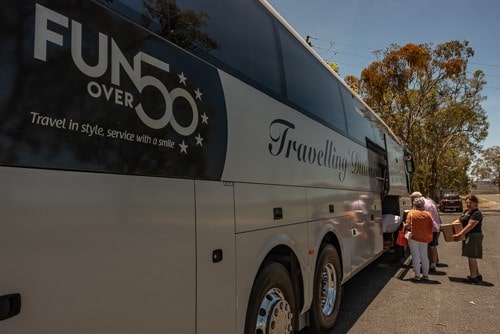
Tourism trailblazer’s love affair with the Granite Belt
We are thrilled to have the support of Fun Over Fifty. CEO Toni Brennan is a sustainable tourism trailblazer, and has been bringing tours out to the Granite Belt for years.
It’s great to see tourism operators standing behind the Granite Belt; we have so much to offer over the Christmas holidays! Summer days on the Granite Belt look like vineyard picnics, new vintage releases, hikes, craft beer, summer produce on lunch menus … plenty of inspiration for a little Granite Belt getaway!”
Fourth-generation vigneron Leanne Puglisi-Gangemi
Fun Over Fifty invited village residents from Halcyon Waters at Hope Island, Golden Crest Manors at Nerang and Elements at Springwood to travel to the Granite Belt to spread some Christmas cheer and buy from the bush.
We have three coaches of enthusiastic shoppers coming through the cellar door. They are visiting Jamworks Gourmet Foods and Ballandean Estate Wines and before taking to the shops in town to fill their Christmas stockings.
Leeanne Puglisi-Gangemi
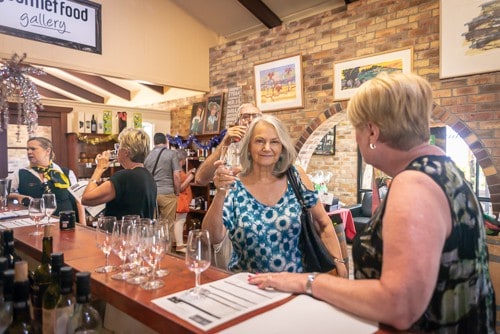
Our People, Our Planet
Amongst other initiatives, Fun Over Fifty’s award-winning Our People, Our Planet Program encourages their guests to contribute to its Green Bank, which distributes funds to conservation groups, community projects and restoration works. Fun Over Fifty’s Green Bank has contributed $5000 to the charity Granite Belt Water Relief and is escorting a 10-tanker water convoy delivering 200,000L of drinking water to the town on Tuesday 17 December 2019.
Whether we’re touring Australia or overseas, our ethos is that everywhere Fun Over Fifty travels, we tread lightly and strive to support the regions we visit. It is vital that we all do our bit to help those in regional areas who are doing it tough at the moment.
Fun over Fifty CEO Ms Brennan
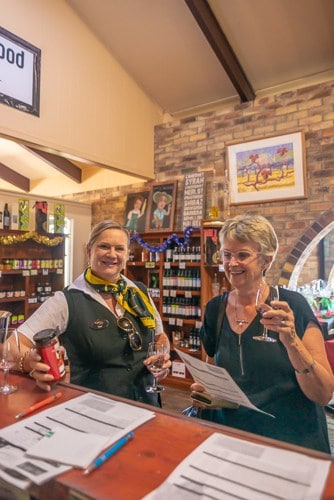
Leeanne Puglisi-Gangemi of Ballandean Estate on the Granite Belt has been honoured with the prestigious Samuel Bassett Award at this week’s 36th Queensland Wine Awards. One of Australia’s most influential woman in wine, Leeanne is the third Puglisi family member to receive this award, which recognises a major contribution by an individual to the Queensland wine industry.
I am truly humbled by this. To stand in the company of industry greats such as Terry Morris from Sirromet and my wine pioneer parents is awe-inspiring. Educating national and international consumers about the quality of Queensland wines is what drives me. That and expanding on my family’s legacy to the Granite Belt.
Leeanne Puglisi-Gangemi
Leeanne’s father Angelo Puglisi, Ballandean Estate’s founder and industry pioneer was presented with the inaugural Bassett award in 2003. Estate Matriarch Mary Puglisi was the first female to be recognised for her contribution to the Queensland wine industry with this award in 2015. Estate manager and sister Robyn Puglisi-Henderson collected the award on Leeanne’s behalf in Brisbane on Tuesday 4 September.
We just live and breathe fine wine! It’s great to see Leeanne recognised for her advocacy. She’s worked tirelessly as an industry ambassador for decades.
I picked up the award on her behalf, as Leeanne was at a board meeting of Australian Grape and Wine in Adelaide. This is yet another place where she is the voice of Queensland wine, making sure we are not forgotten.
Leeanne loves a chat at the cellar door, as she does the opportunity to talk strategic Australian wine industry direction with politicians and industry heavyweights.
Robyn Puglisi-Henderson
Ballandean Estate has a rich history of empowered women in wine. Business and Export Manager Robyn Puglisi-Henderson developed the export trade from zero to 20% of business turnover in just five years, and has opened up export trade to China, where there is significant demand for Ballandean’s premium reds.
Leeanne and Robyn’s grandmother Josephine was a true Australian pioneer and business woman. Arriving in Australia from Sicily at just 12 years of age, she went on to build the foundation of Ballandean Estate with her father and husband over four decades. She stared down the Australian army demanding to put her husband and father in internment camps and surrender of farm machinery during World War 2, and instead, she negotiated a deal to supply their crops to feed the Army as an alternative.
At just 19 years of age, estate matriarch and wine pioneer Mary Puglisi visualised opening a cellar door and being the catalyst for Queensland’s Barossa and Hunter Valley on the Granite Belt with husband Angelo Puglisi. She spent 50 years building the Granite’s Belt’s thriving tourism industry.
Leeanne Puglisi-Gangemi was recently voted onto the Winemaker’s Federation board, and is Queensland’s first female voice and vote.
The Bassett Award is named after wine industry pioneer Samuel Bassett who established Bassett’s Winery at Roma in 1863 and went on to win many medals for his wines, including 10 of the 11 awarded at the 1901 Royal Brisbane Show.
ENDS
For all media enquiries please contact:
Leeanne Puglisi-Gangemi or Robyn Puglisi-Henderson
Ph: (07) 4684 1226
Ballandean Estate is set to release its latest Strange Bird™, a 2019 Moscato Giallo to coincide with the father of Queensland wine’s 76th birthday on Monday 29 July 2019.
Angelo Puglisi, estate owner of Queensland’s oldest family-owned and -operated winery, planted his first acre of Moscato Giallo vines in 2014. A wine pioneer, Angelo’s vinicultural vision has delivered 13 new Strange Birds™ for the Granite Belt Geographical Indication.
Fourth-generation vigneron and daughter Leeanne Puglis-Gangemi says,
First you need to understand the Italian! Moscato Giallo means ‘yellow muscat’. Now you might be thinking this a sweet wine. Not this time! This Strange Bird™ variety from northern Italy is capable of making elegant table wines with emphasis on the aromatics.
Dad harvested the luscious golden fruit in March 2019. Our winemaker Dylan Rhymer has delivered an elegant twist on the varietal. Think medium-dry, a light and luscious mouthfeel, with a hint of lemon and gentle citrus overtone. Best of all, be blown away by the aromatic bouquet!
Our 2019 Moscato Giallo Strange Bird™ has just 9% alcohol, and is a match made in heaven with an afternoon cheese platter and Asian flavour profiles. It’s a big, fruit-driven delight, somewhere between a Gewertztraminer and our Semillon Sauvignon Blanc.
Ballandean Estate’s 2019 Moscato Giallo retails for just $19 a bottle, and can be ordered online and at at the cellar door. We wil be showcasing this wine at The Ekka. You can also buy it at Bacchus Brewing, Schulte’s Meat Tavern and Pantry360. Only 200 cases were produced. This Strange Bird™ will be gone before you know it!
Leeanne Puglis-Gangemi
Mr Puglisi’s remarkable vinicultural legacy was celebrated at the Royal Queensland show last week. He presented the inaugural Angelo Puglisi Grand Champion Wine of Show award to a Tasmanian pinot noir producer. The award is a perpetual acknowledgment to Puglisi’s influence and respect in the industry.
Ballandean Estate will soon release its 2018 Opera Block Shiraz, the 50th Anniversary edition of the Shiraz planted 50 years ago. It is available now at the pre-release price of $50 per bottle. Keep your eye out for the 2019 vintage release of the estate’s ever popular Semillon Sauvignon Blanc and Rose wines.
Ballandean Estate has a rich history of empowered women in wine. Leeanne Puglisi-Gangemi was recently voted onto the Winemaker’s Federation board, and is Queensland’s first female voice and vote.
At just 19 years of age, estate matriarch and wine pioneer Mary Puglisi visualised opening a cellar door and being the catalyst for Queensland’s Barossa and Hunter Valley on the Granite Belt with husband Angelo Puglisi. She has spent over 50 years looking after tourists and has won the prestigious Samuel Basset award for her contribution to the Queensland wine industry.
Angelo’s mother Josephine was a true Australian pioneer and business woman. Arriving in Australia from Sicily at just 12 years of age, she went on to build the foundation of Ballandean Estate with her father and husband over four decades. She stared down the Australian army demanding to put her husband and father in internment camps and surrender of farm machinery during World War 2, and instead, she negotiated a deal to supply their crops to feed the Army as an alternative. Inspirational!
Ballandean Estate’s Business and Export Manager Robyn Puglisi-Henderson has developed the export trade from zero to 20% of our business turnover in just five years, and has opened up our export trade to China, where there is significant demand for our premium reds. They just love our Shiraz!
Meet our new vineyard manager Robyn Robertston
Ballandean Estate continues to break new ground with the appointment of a female vineyard manager, Robyn Robertson, former vineyard managed at Sirromet Wines. She brings over 30 years of viticultural expertise to the estate, and has spent her entire life on the land at Ballandean.
I am thrilled to be at Ballandean Estate, the Puglisis have welcomed me into their family. When I heard that there was an opening, the opportunity to learn in the presence of Queensland’s father of wine Angelo Puglisi was just too good to pass up.
Robyn Robertston
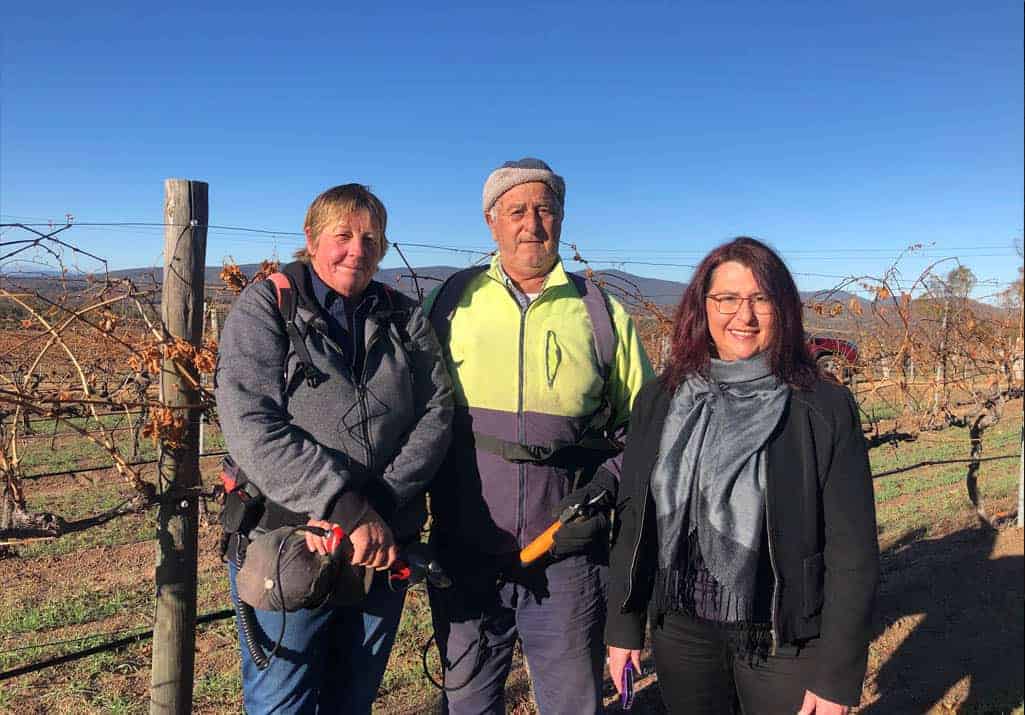
Granite Belt wine pioneers
Twisted Gum Wines owner Michelle Coelli has been an outstanding support to the local industry. She’s great to talk to, and runs monthly farm walks at different vineyards. Sue Smith from Pyramid Wines is another Granite Belt woman in the industry I admire.
Robyn Robertston
Why Robyn made the move from Sirromet to Ballandean Estate
Sirromet’s founder Tony Morris was really supportive of the move across to Ballandean and the chance for me to pursue my viticultural passion. One of the Sirromet properties I managed was my family property. I’ve worked on that property for over 20 years, and it was once our family orchard.
Nurturing Ballandean Estate’s Strange Birds™ was another drawcard, as the grapes at Sirromet are mainly traditional varieties. Fiano, Saperavi, Malbec, Durif, Tempranillo, Viognier … so many new challenges! I am most excited about the Durif 2020 vintage—it is such a temperamental Strange Bird™ , as it produces a heavy crop. If we don’t prune enough now, it will over-fruit. Given the drought conditions, it is critical that we prune hard to ensure a low yield of high quality.
Every day is different at Ballandean Estate—I could be pruning, tasting fruit, showing a tour group through our vines, maintaining irrigation lines or running harvest teams. I spend a lot of time with Angelo on the vineyards. Such a privilege to work with a master viticulturist. It is in his blood and mine.
Robyn Robertston
Robyn came on board mid-vintage and experienced a baptism of fire in an incredibly challenging season, with the Girraween bushfires blazing. Her influential position is made even more remarkable when despite gender-equal enrolments in wine and viticulture courses, women make up less than 10 per cent of the wine industry workforce, according to a large-scale Australian study by the Curtin Graduate School of Business, Women in top roles in the wine industry: Forging ahead or falling behind? Representation of women in leadership and senior roles is even smaller.
ENDS
For all media enquiries please contact:
Leeanne Puglisi-Gangemi or Robyn Puglisi-Henderson
Ph: (07) 4684 1226
Taking Provenance Seriously: Will Australia Benefit from Better Legal Protection for GIs? Colloquium at Bond University on Monday 12 February saw the Granite Belt weigh in to a Geographical Indications (GI) debate with EU Commissioner for Agriculture and Rural Development Phil Hogan. Organised by the Centre for Commercial Law, the event investigated how the European experience can inform the local debate about more effective protection for local brands and rural communities and was attended by over 80 stakeholders. Image credit: Bond University Newsroom
Fourth-generation vigneron Leeanne Puglisi-Gangemi represented Ballandean Estate and the Granite Belt with her insightful presentation on The experience with GIs: Benefits for wine and other industries in a declared GI region.
“Wine drinkers want to know where their wine comes from, and wine producers want protection against competitors who take a free ride on the hard-earned reputation of their unique products. Australia has yet to adopt the EU’s twin GI model for food and wine—as it stands, only the wine industry has registered Geographic Indicators, around 109 at last count,” says Ms Puglisi-Gangemi.
GIs, or geographical indications, identify a product that originates in a specific region where a particular characteristic is attributable to its geographical origin. In Australia, GIs are only applied to wine regions at the moment: 109 Australian wine GIs are already protected in Europe under a longstanding, mutually beneficial agreement sealed in 1994, The GI system is designed to protect the use of the regional name under international law and is governed by the Geographical Indications Committee, overseen by Wine Australia.
European Union Agriculture and Rural Development Commissioner Phil Hogan is visiting Australia to lay the groundwork for an EU-Australia free trade agreement.
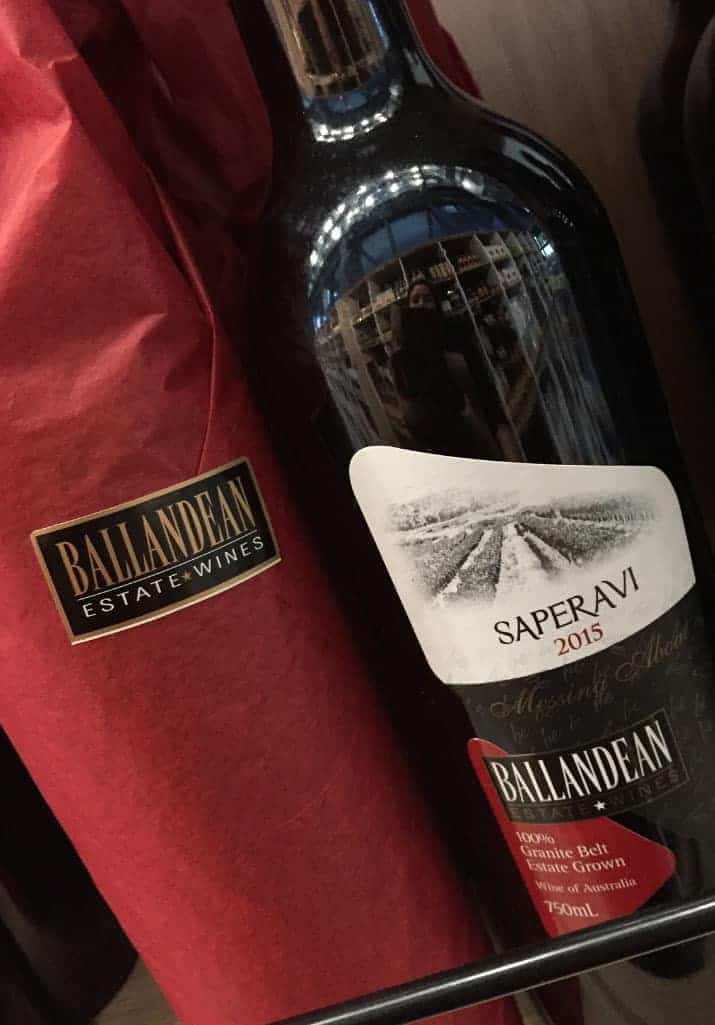
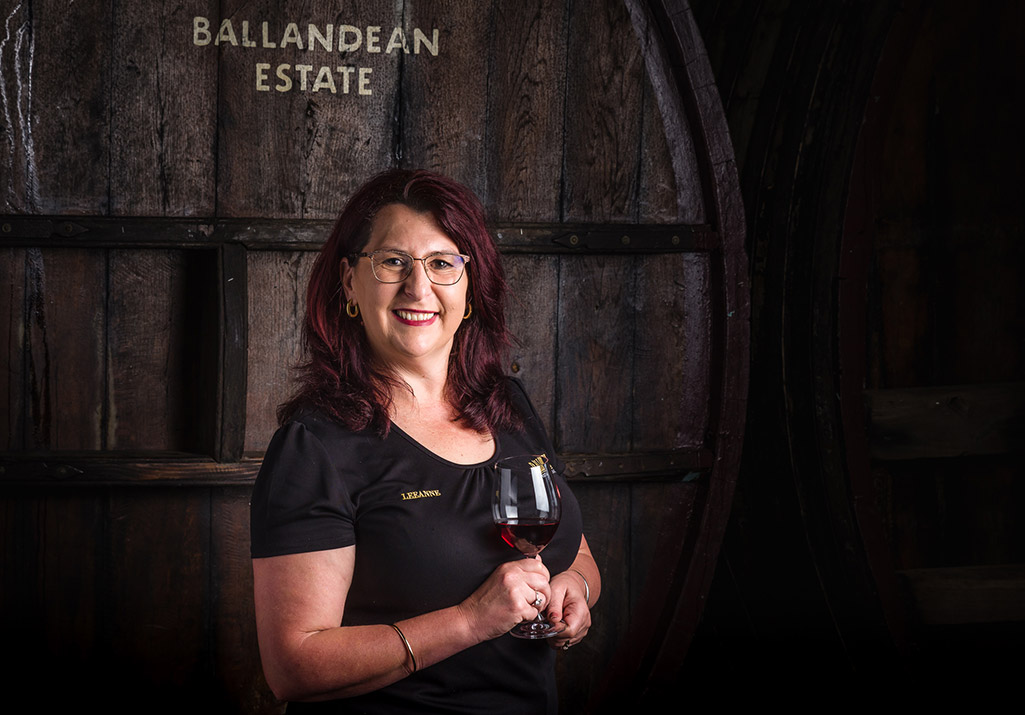
What is the value of Geographical Indication to Granite Belt wine producers?
One of Australia’s most influential women in wine, Leeanne Puglisi-Gangemi gets excited when she talks about the value of the Geographical Indication to Granite Belt wine producers.
“We are the Granite Belt and we are proud! Well, it is our sense of place and most producers in the region are proud of the wines being grown and made in the Granite Belt. So much so, that the Granite Belt Wine Tourism association took the notion one step further with the creation of our Strange Bird™ Wine Trail 13 years ago. It is a kind of appellation with strict rules applying to the wineries if they want their wines to be known as Strange Birds™: Wine to be produced on the Granite Belt, Fruit to be grown on the Granite Belt, Fruit must be alternative—representing less than 1% of the total annual crush as prescribed by Wine Australia.
How has Strange Bird™ benefited Granite Belt wineries?
“Today, the Australian wine consumer is ready and willing to taste wines they have never heard of—the rarer the variety the better. Twenty years ago, this was not the case as Australian wine drinkers were not so brave. Consumers today are also willing to pay premiums for such rare finds.
“If your cellar door does not have a Strange Bird™ on the list you are missing out on sales. And with approximately 75% of all wine produced in the Granite Belt sold directly to tourists, this is an opportunity not to be missed.
“Another benefit of trademarking our Strange Birds™ has been renewed enthusiasm by local producer. Vignerons are on the hunt for new varieties to grow in the Granite Belt. This planting frenzy seen our grape growers searching for new varieties that suit our terroir – grapes that grow well in our unique climatic conditions and soils.
“As a result, the Granite Belt has been winning international awards at an exponential rate. So with the success of Strange Birds™ and the potential of our food trail, the importance of our GI cannot be underestimated.
“I tell our cellar door visitors that we make fantastic Shiraz in Ballandean and have done so for 50 years. But in just 14 short years of growing Saperavi in Ballandean we have been named in the top three producers of the world (outside of its native Georgia). From grapes grown on our Ballandean vineyard in the Granite Belt.
Along the Granite Belt’s Strange Bird Wine Trail with Leeanne-Puglisi Gangemi
GIs loom as a sticking point in FTA negotiations next month with Australian producers concerned they could be forced to give up the right to use certain names such as prosecco and feta.
How can GIs bolster rural communities?
But Mr Hogan said GIs were “not one-way traffic”.
“There is a clear potential to extend GI protection to high-quality Australian food products (in the EU),” the Commissioner said.
“I have been told a number of potential Australian candidates for GI protection are on their way, such as King Island dairy products, King Island beef, Tasmanian whisky, Tasmanian lobster, Huon Salmon and Bangalow pork.
“The price obtained by a producer of a traditional product is two-and-a-quarter times the price received for a comparable non-local product.
Mr Hogan said the European experience showed GIs bolstered rural communities and netted higher incomes for producers.
